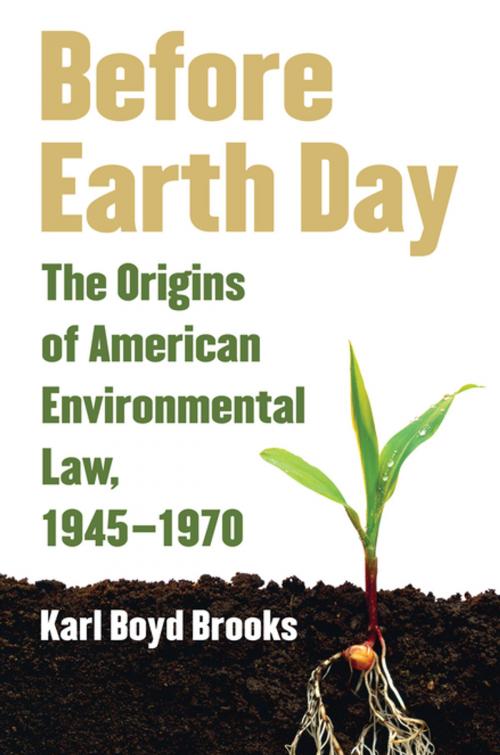Before Earth Day
The Origins of American Environmental Law, 1945-1970
Nonfiction, Reference & Language, Law, Environmental, Social & Cultural Studies, Political Science, Government, Public Policy, History, Americas, United States, 20th Century| Author: | Karl Boyd Brooks | ISBN: | 9780700623181 |
| Publisher: | University Press of Kansas | Publication: | September 28, 2017 |
| Imprint: | University Press of Kansas | Language: | English |
| Author: | Karl Boyd Brooks |
| ISBN: | 9780700623181 |
| Publisher: | University Press of Kansas |
| Publication: | September 28, 2017 |
| Imprint: | University Press of Kansas |
| Language: | English |
Most Americans—even environmentalists—date the emergence of laws protecting nature to the early 1970s. But Karl Boyd Brooks shows that, far from being a product of that activist decade, American environmental law emerged well before the first Earth Day, often in unexpected places far from Capitol Hill.
Surveying the landscape from the end of World War II to Earth Day 1970, Brooks traces a dramatic shift in Americans' relationship to the environment and the emergence of new environmental statutes. He takes readers into legislative hearing rooms, lawyers' conferences, and administrators' offices to describe how Americans forged a new body of law that reflected their hopes for rescuing the land from air pollution, deforestation, and other potential threats. For while previous law had treated nature as a commodity, more and more Americans had come to see it as a national treasure worth preserving.
Brooks explores the way key features of the New Deal's legal legacy influenced environmental law. This path-breaking environmental history examines how cultural, intellectual, and economic changes in postwar America brought about new solutions to environmental problems that threatened public health and degraded natural aesthetics. Visiting riverbanks and freeways, duck blinds and airsheds, Before Earth Day reveals the new strategies and efforts by which the unceasing process of legal change created environmental law. And through real-world examples—how Los Angelenos pressed cases about water and air quality, how an Idaho lawyer helped clients pursue new environmental regulations, how citizens challenged government and corporate plans to dam rivers—Brooks demonstrates that key changes in property, procedure, contract, and other legal rules in those early years stimulated the national environmental laws to come.
Gracefully written and meticulously researched, Brooks's work dramatically updates our understanding of the origins of environmental law. By taking the postwar years more seriously, he shows that earlier actions across the country played a central role in shaping the structure and goals of well-known federal laws passed during the "environmental decade" of the seventies. Before Earth Day describes nothing less than an entirely new way of thinking, as environmental law emerged from local jurisdictions to reshape national agendas, firing the popular imagination and only then remodeling law school curricula. A long-needed corrective to standard political and legal history, it demonstrates both the longstanding environmental concerns of Americans and the resilience of law.
Most Americans—even environmentalists—date the emergence of laws protecting nature to the early 1970s. But Karl Boyd Brooks shows that, far from being a product of that activist decade, American environmental law emerged well before the first Earth Day, often in unexpected places far from Capitol Hill.
Surveying the landscape from the end of World War II to Earth Day 1970, Brooks traces a dramatic shift in Americans' relationship to the environment and the emergence of new environmental statutes. He takes readers into legislative hearing rooms, lawyers' conferences, and administrators' offices to describe how Americans forged a new body of law that reflected their hopes for rescuing the land from air pollution, deforestation, and other potential threats. For while previous law had treated nature as a commodity, more and more Americans had come to see it as a national treasure worth preserving.
Brooks explores the way key features of the New Deal's legal legacy influenced environmental law. This path-breaking environmental history examines how cultural, intellectual, and economic changes in postwar America brought about new solutions to environmental problems that threatened public health and degraded natural aesthetics. Visiting riverbanks and freeways, duck blinds and airsheds, Before Earth Day reveals the new strategies and efforts by which the unceasing process of legal change created environmental law. And through real-world examples—how Los Angelenos pressed cases about water and air quality, how an Idaho lawyer helped clients pursue new environmental regulations, how citizens challenged government and corporate plans to dam rivers—Brooks demonstrates that key changes in property, procedure, contract, and other legal rules in those early years stimulated the national environmental laws to come.
Gracefully written and meticulously researched, Brooks's work dramatically updates our understanding of the origins of environmental law. By taking the postwar years more seriously, he shows that earlier actions across the country played a central role in shaping the structure and goals of well-known federal laws passed during the "environmental decade" of the seventies. Before Earth Day describes nothing less than an entirely new way of thinking, as environmental law emerged from local jurisdictions to reshape national agendas, firing the popular imagination and only then remodeling law school curricula. A long-needed corrective to standard political and legal history, it demonstrates both the longstanding environmental concerns of Americans and the resilience of law.















